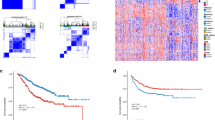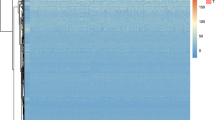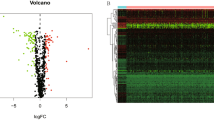Abstract
Purpose
Colon cancer presents challenges to clinical diagnosis and management due to its high heterogeneity. For more efficient and convenient diagnosis and treatment of colon cancer, we are committed to characterizing the molecular features of colon cancer by pioneering a classification system based on metabolic pathways.
Methods
Based on the 113 metabolic pathways and genes collected in the previous stage, we scored and filtered the metabolic pathways of each sample in the training set by ssGSEA, and obtained 16 metabolic pathways related to colon cancer recurrence. In consistent clustering of training set samples with recurrence-related metabolic pathway scores, we identified two robust molecular subtypes of colon cancer (MC1 and MC2). Furthermore, we performed multi-angle analysis on the survival differences of subtypes, metabolic characteristics, clinical characteristics, functional enrichment, immune infiltration, differences with other subtypes, stemness indices, TIDE prediction, and drug sensitivity, and finally constructed colon cancer prognostic model.
Results
The results showed that the MC1 subtype had a poor prognosis based on higher immune activity and immune checkpoint gene expression. The MC2 subtype is associated with high metabolic activity and low expression of immune checkpoint genes and a better prognosis. The MC2 subtype was more responsive to PD-L1 immunotherapy than the MC1 subclass. However, we did not observe significant differences in tumor mutational burden between the two.
Conclusion
Two molecular subtypes of colon cancer based on metabolic pathways have distinct immune signatures. Constructing prognostic models based on subtype differential genes provides valuable reference for personalized therapy targeting unique tumor metabolic signatures.
















Similar content being viewed by others
Data availability
The datasets used during the current study are available from the corresponding author on reasonable request.
Abbreviations
- BCR:
-
B-cell receptor
- CGP:
-
Cancer genome project
- CMS:
-
Consensus molecular subtype
- DEGs:
-
Differentially expressed genes
- GSVA:
-
Gene set variation analysis
- LDHA:
-
Lactate depletion hydrogenase A1
- TCR:
-
T-cell receptor
- TMB:
-
Tumor mutational burden
References
Becht E, Giraldo NA, Lacroix L, Buttard B, Elarouci N, Petitprez F, Selves J, Laurent-Puig P, Sautès-Fridman C, Fridman WH, de Reyniès A (2016) Estimating the population abundance of tissue-infiltrating immune and stromal cell populations using gene expression. Genome Biol 17:218. https://doi.org/10.1186/s13059-016-1070-5
Berndsen RH, Swier N, van Beijnum JR, Nowak-Sliwinska P (2019) Colorectal cancer growth retardation through induction of apoptosis, using an optimized synergistic cocktail of axitinib, erlotinib, and dasatinib. Cancers (basel). https://doi.org/10.3390/cancers11121878
Ceccarelli M, Barthel FP, Malta TM, Sabedot TS, Salama SR, Murray BA, Morozova O, Newton Y, Radenbaugh A, Pagnotta SM et al (2016) Molecular profiling reveals biologically discrete subsets and pathways of progression in diffuse glioma. Cell 164:550–563. https://doi.org/10.1016/j.cell.2015.12.028
Chang K, Willis JA, Reumers J, Taggart MW, San Lucas FA, Thirumurthi S, Kanth P, Delker DA, Hagedorn CH, Lynch PM et al (2018) Colorectal premalignancy is associated with consensus molecular subtypes 1 and 2. Ann Oncol 29:2061–2067. https://doi.org/10.1093/annonc/mdy337
Charoentong P, Finotello F, Angelova M, Mayer C, Efremova M, Rieder D, Hackl H, Trajanoski Z (2017) Pan-cancer immunogenomic analyses reveal genotype-immunophenotype relationships and predictors of response to checkpoint blockade. Cell Rep 18:248–262. https://doi.org/10.1016/j.celrep.2016.12.019
Choi J, Kim DH, Jung WH, Koo JS (2013) Metabolic interaction between cancer cells and stromal cells according to breast cancer molecular subtype. Breast Cancer Res 15:R78. https://doi.org/10.1186/bcr3472
de Sousa EMF, Colak S, Buikhuisen J, Koster J, Cameron K, de Jong JH, Tuynman JB, Prasetyanti PR, Fessler E, van den Bergh SP et al (2011) Methylation of cancer-stem-cell-associated Wnt target genes predicts poor prognosis in colorectal cancer patients. Cell Stem Cell 9:476–485. https://doi.org/10.1016/j.stem.2011.10.008
Diboun I, Wernisch L, Orengo CA, Koltzenburg M (2006) Microarray analysis after RNA amplification can detect pronounced differences in gene expression using limma. BMC Genom 7:252. https://doi.org/10.1186/1471-2164-7-252
Dienstmann R, Vermeulen L, Guinney J, Kopetz S, Tejpar S, Tabernero J (2017) Consensus molecular subtypes and the evolution of precision medicine in colorectal cancer. Nat Rev Cancer 17:268. https://doi.org/10.1038/nrc.2017.24
Eide PW, Bruun J, Lothe RA, Sveen A (2017) CMScaller: an R package for consensus molecular subtyping of colorectal cancer pre-clinical models. Sci Rep 7:16618. https://doi.org/10.1038/s41598-017-16747-x
El-Deeb NM, Ibrahim OM, Mohamed MA, Farag MMS, Farrag AA, El-Aassar MR (2022) Alginate/kappa-carrageenan oral microcapsules loaded with Agaricus bisporus polysaccharides MH751906 for natural killer cells mediated colon cancer immunotherapy. Int J Biol Macromol 205:385–395. https://doi.org/10.1016/j.ijbiomac.2022.02.058
Fontana E, Eason K, Cervantes A, Salazar R, Sadanandam A (2019) Context matters-consensus molecular subtypes of colorectal cancer as biomarkers for clinical trials. Ann Oncol 30:520–527. https://doi.org/10.1093/annonc/mdz052
Fu J, Li K, Zhang W, Wan C, Zhang J, Jiang P, Liu XS (2020) Large-scale public data reuse to model immunotherapy response and resistance. Genome Med 12:21. https://doi.org/10.1186/s13073-020-0721-z
Gabor Miklos GL (2005) The human cancer genome project–one more misstep in the war on cancer. Nat Biotechnol 23:535–537. https://doi.org/10.1038/nbt0505-535
Galsky MD, Arija JAA, Bamias A, Davis ID, De Santis M, Kikuchi E, Garcia-Del-Muro X, De Giorgi U, Mencinger M, Izumi K et al (2020) Atezolizumab with or without chemotherapy in metastatic urothelial cancer (IMvigor130): a multicentre, randomised, placebo-controlled phase 3 trial. Lancet 395:1547–1557. https://doi.org/10.1016/S0140-6736(20)30230-0
Gautier L, Cope L, Bolstad BM, Irizarry RA (2004) affy–analysis of Affymetrix GeneChip data at the probe level. Bioinformatics 20:307–315. https://doi.org/10.1093/bioinformatics/btg405
Geeleher P, Cox N, Huang RS (2014) pRRophetic: an R package for prediction of clinical chemotherapeutic response from tumor gene expression levels. PLoS ONE 9:e107468. https://doi.org/10.1371/journal.pone.0107468
Hänzelmann S, Castelo R, Guinney J (2013) GSVA: gene set variation analysis for microarray and RNA-seq data. BMC Bioinform 14:7. https://doi.org/10.1186/1471-2105-14-7
Hanzelmann S, Castelo R, Guinney J (2013) GSVA: gene set variation analysis for microarray and RNA-seq data. BMC Bioinform 14:7. https://doi.org/10.1186/1471-2105-14-7
Huang CY, Fang YJ, Abulimiti A, Yang X, Li L, Liu KY, Zhang X, Feng XL, Chen YM, Zhang CX (2020) Dietary polyamines intake and risk of colorectal cancer: a case–control study. Nutrients. https://doi.org/10.3390/nu12113575
Jenniskens JCA, Offermans K, Simons C, Samarska I, Fazzi GE, Smits KM, Schouten LJ, Weijenberg MP, Grabsch HI, van den Brandt PA (2022) Energy balance-related factors in childhood and adolescence and risk of colorectal cancer expressing different levels of proteins involved in the Warburg-effect. Int J Cancer 150:1812–1824. https://doi.org/10.1002/ijc.33941
Jiang P, Gu S, Pan D, Fu J, Sahu A, Hu X, Li Z, Traugh N, Bu X, Li B et al (2018) Signatures of T cell dysfunction and exclusion predict cancer immunotherapy response. Nat Med 24:1550–1558. https://doi.org/10.1038/s41591-018-0136-1
Jones PA, Baylin SB (2007) The epigenomics of cancer. Cell 128:683–692. https://doi.org/10.1016/j.cell.2007.01.029
Jongmans MCJ, Zhang J, Aya-Crc Study G, Hoogerbrugge N, Ligtenberg MJL, De Voer RM (2022). Genetic cancer susceptibility in adolescents and adults 25 years or younger with colorectal cancer. Gastroenterol 162:969-974.e966. https://doi.org/10.1053/j.gastro.2021.11.009
Jorissen RN, Gibbs P, Christie M, Prakash S, Lipton L, Desai J, Kerr D, Aaltonen LA, Arango D, Kruhoffer M et al (2009) Metastasis-associated gene expression changes predict poor outcomes in patients with dukes stage B and C colorectal cancer. Clin Cancer Res 15:7642–7651. https://doi.org/10.1158/1078-0432.CCR-09-1431
Kasprzak A (2021) Insulin-like growth factor 1 (IGF-1) signaling in glucose metabolism in colorectal cancer. Int J Mol Sci. https://doi.org/10.3390/ijms22126434
Kim S, Huh JW, Lee WY, Yun SH, Kim HC, Cho YB, Park YA, Shin JK (2022) Oncologic outcomes of pathologic T4 and T3 colon cancer patients diagnosed with clinical T4 stage disease using preoperative computed tomography scan. Surg Oncol 41:101749. https://doi.org/10.1016/j.suronc.2022.101749
Kitazawa M, Hatta T, Sasaki Y, Fukui K, Ogawa K, Fukuda E, Goshima N, Okita N, Yamada Y, Nakagama H et al (2020) Promotion of the Warburg effect is associated with poor benefit from adjuvant chemotherapy in colorectal cancer. Cancer Sci 111:658–666. https://doi.org/10.1111/cas.14275
Kotani D, Nakamura Y, Fujisawa T, Bando H, Sakamoto N, Johns AL, Park K, Icgc A, Casolino R, Yoshino T, Biankin AV (2022) ICGC-ARGO precision medicine: targeted therapy according to longitudinal assessment of tumour heterogeneity in colorectal cancer. Lancet Oncol 23:463–464. https://doi.org/10.1016/S1470-2045(22)00142-5
Lahoz S, Archilla I, Asensio E, Hernandez-Illan E, Ferrer Q, Lopez-Prades S, Nadeu F, Del Rey J, Sanz-Pamplona R, Lozano JJ et al (2022) Copy-number intratumor heterogeneity increases the risk of relapse in chemotherapy-naive stage II colon cancer. J Pathol 257:68–81. https://doi.org/10.1002/path.5870
Lavoie S, Chun E, Bae S, Brennan CA, Gallini Comeau CA, Lang JK, Michaud M, Hoveyda HR, Fraser GL, Fuller MH et al (2020) Expression of free fatty acid receptor 2 by dendritic cells prevents their expression of interleukin 27 and is required for maintenance of mucosal barrier and immune response against colorectal tumors in mice. Gastroenterology 158(1359–1372):e1359. https://doi.org/10.1053/j.gastro.2019.12.027
Lenz HJ, Ou FS, Venook AP, Hochster HS, Niedzwiecki D, Goldberg RM, Mayer RJ, Bertagnolli MM, Blanke CD, Zemla T et al (2019) Impact of consensus molecular subtype on survival in patients with metastatic colorectal cancer: results from CALGB/SWOG 80405 (alliance). J Clin Oncol 37:1876–1885. https://doi.org/10.1200/JCO.18.02258
Li W, Wang H, Ma Z, Zhang J, Ou-Yang W, Qi Y, Liu J (2019) Multi-omics analysis of microenvironment characteristics and immune escape mechanisms of hepatocellular carcinoma. Front Oncol 9:1019. https://doi.org/10.3389/fonc.2019.01019
Lindner AU, Salvucci M, McDonough E, Cho S, Stachtea X, O’Connell EP, Corwin AD, Santamaria-Pang A, Carberry S, Fichtner M et al (2022) An atlas of inter- and intra-tumor heterogeneity of apoptosis competency in colorectal cancer tissue at single-cell resolution. Cell Death Differ 29:806–817. https://doi.org/10.1038/s41418-021-00895-9
Liu X, Wan X, Kan H, Wang Y, Yu F, Feng L, Jin J, Zhang P, Ma X (2018) Hypoxia-induced upregulation of Orai1 drives colon cancer invasiveness and angiogenesis. Eur J Pharmacol 832:1–10. https://doi.org/10.1016/j.ejphar.2018.05.008
Lu M, Liu Z, Li B, Wang G, Li D, Zhu Y (2017) The high expression of long non-coding RNA PANDAR indicates a poor prognosis for colorectal cancer and promotes metastasis by EMT pathway. J Cancer Res Clin Oncol 143:71–81. https://doi.org/10.1007/s00432-016-2252-y
Malta TM, Sokolov A, Gentles AJ, Burzykowski T, Poisson L, Weinstein JN, Kaminska B, Huelsken J, Omberg L, Gevaert O et al (2018) Machine learning identifies stemness features associated with oncogenic dedifferentiation. Cell 173(338–354):e315. https://doi.org/10.1016/j.cell.2018.03.034
Marisa L, de Reyniès A, Duval A, Selves J, Gaub MP, Vescovo L, Etienne-Grimaldi MC, Schiappa R, Guenot D, Ayadi M et al (2013) Gene expression classification of colon cancer into molecular subtypes: characterization, validation, and prognostic value. PLoS Med 10:e1001453. https://doi.org/10.1371/journal.pmed.1001453
Marisa L, Blum Y, Taieb J, Ayadi M, Pilati C, Le Malicot K, Lepage C, Salazar R, Aust D, Duval A et al (2021) Intratumor CMS heterogeneity impacts patient prognosis in localized colon cancer. Clin Cancer Res 27:4768–4780. https://doi.org/10.1158/1078-0432.CCR-21-0529
Mayakonda A, Lin DC, Assenov Y, Plass C, Koeffler HP (2018) Maftools: efficient and comprehensive analysis of somatic variants in cancer. Genome Res 28:1747–1756. https://doi.org/10.1101/gr.239244.118
McGrail DJ, Garnett J, Yin J, Dai H, Shih DJH, Lam TNA, Li Y, Sun C, Li Y, Schmandt R et al (2020) Proteome instability is a therapeutic vulnerability in mismatch repair-deficient cancer. Cancer Cell 37(371–386):e312. https://doi.org/10.1016/j.ccell.2020.01.011
Meiller C, Montagne F, Hirsch TZ, Caruso S, de Wolf J, Bayard Q, Assie JB, Meunier L, Blum Y, Quetel L et al (2021) Multi-site tumor sampling highlights molecular intra-tumor heterogeneity in malignant pleural mesothelioma. Genome Med 13:113. https://doi.org/10.1186/s13073-021-00931-w
Nenkov M, Ma Y, Gassler N, Chen Y (2021) Metabolic reprogramming of colorectal cancer cells and the microenvironment: implication for therapy. Int J Mol Sci. https://doi.org/10.3390/ijms22126262
Ogrodzinski MP, Teoh ST, Lunt SY (2021) Targeting subtype-specific metabolic preferences in nucleotide biosynthesis inhibits tumor growth in a breast cancer model. Cancer Res 81:303–314. https://doi.org/10.1158/0008-5472.CAN-20-1666
Oh HR, An CH, Yoo NJ, Lee SH (2014) Somatic mutations of amino acid metabolism-related genes in gastric and colorectal cancers and their regional heterogeneity—a short report. Cell Oncol (dordr) 37:455–461. https://doi.org/10.1007/s13402-014-0209-1
Ohm JE, McGarvey KM, Yu X, Cheng L, Schuebel KE, Cope L, Mohammad HP, Chen W, Daniel VC, Yu W et al (2007) A stem cell–like chromatin pattern may predispose tumor suppressor genes to DNA hypermethylation and heritable silencing. Nat Genet 39:237–242. https://doi.org/10.1038/ng1972
Racle J, de Jonge K, Baumgaertner P, Speiser DE, Gfeller D (2017) Simultaneous enumeration of cancer and immune cell types from bulk tumor gene expression data. Elife. https://doi.org/10.7554/eLife.26476
Riaz N, Havel JJ, Makarov V, Desrichard A, Urba WJ, Sims JS, Hodi FS, Martín-Algarra S, Mandal R, Sharfman WH et al (2017) Tumor and microenvironment evolution during immunotherapy with nivolumab. Cell 171:934-949.e916. https://doi.org/10.1016/j.cell.2017.09.028
Ritchie ME, Phipson B, Wu D, Hu Y, Law CW, Shi W, Smyth GK (2015) limma powers differential expression analyses for RNA-sequencing and microarray studies. Nucleic Acids Res 43:e47. https://doi.org/10.1093/nar/gkv007
Roh W, Chen PL, Reuben A, Spencer CN, Prieto PA, Miller JP, Gopalakrishnan V, Wang F, Cooper ZA, Reddy SM et al (2017) Integrated molecular analysis of tumor biopsies on sequential CTLA-4 and PD-1 blockade reveals markers of response and resistance. Sci Translatl Med. https://doi.org/10.1126/scitranslmed.aah3560
Sanchez-Lopez E, Flashner-Abramson E, Shalapour S, Zhong Z, Taniguchi K, Levitzki A, Karin M (2016) Targeting colorectal cancer via its microenvironment by inhibiting IGF-1 receptor-insulin receptor substrate and STAT3 signaling. Oncogene 35:2634–2644. https://doi.org/10.1038/onc.2015.326
Shan Z, Wu W, Yan X, Yang Y, Luo D, Liu Q, Li X, Goel A, Ma Y (2021) A novel epithelial-mesenchymal transition molecular signature predicts the oncological outcomes in colorectal cancer. J Cell Mol Med 25:3194–3204. https://doi.org/10.1111/jcmm.16387
Smith JJ, Deane NG, Wu F, Merchant NB, Zhang B, Jiang A, Lu P, Johnson JC, Schmidt C, Bailey CE et al (2010) Experimentally derived metastasis gene expression profile predicts recurrence and death in patients with colon cancer. Gastroenterology 138:958–968. https://doi.org/10.1053/j.gastro.2009.11.005
Soldevilla B, Carretero-Puche C, Gomez-Lopez G, Al-Shahrour F, Riesco MC, Gil-Calderon B, Alvarez-Vallina L, Espinosa-Olarte P, Gomez-Esteves G, Rubio-Cuesta B et al (2019) The correlation between immune subtypes and consensus molecular subtypes in colorectal cancer identifies novel tumour microenvironment profiles, with prognostic and therapeutic implications. Eur J Cancer 123:118–129. https://doi.org/10.1016/j.ejca.2019.09.008
Thorsson V, Gibbs DL, Brown SD, Wolf D, Bortone DS, Ou Yang TH, Porta-Pardo E, Gao GF, Plaisier CL, Eddy JA et al (2019) The immune landscape of cancer. Immunity 51:411–412. https://doi.org/10.1016/j.immuni.2019.08.004
Tripathi MK, Deane NG, Zhu J, An H, Mima S, Wang X, Padmanabhan S, Shi Z, Prodduturi N, Ciombor KK et al (2014) Nuclear factor of activated T-cell activity is associated with metastatic capacity in colon cancer. Can Res 74:6947–6957. https://doi.org/10.1158/0008-5472.can-14-1592
van der Maaten L (2014) Accelerating t-SNE using tree-based algorithms. J Mach Learn Res 15:3221–3245
Wilkerson MD, Hayes DN (2010) ConsensusClusterPlus: a class discovery tool with confidence assessments and item tracking. Bioinformatics 26:1572–1573. https://doi.org/10.1093/bioinformatics/btq170
Yan L, Tan Y, Chen G, Fan J, Zhang J (2021) Harnessing metabolic reprogramming to improve cancer immunotherapy. Int J Mol Sci. https://doi.org/10.3390/ijms221910268
Yang C, Huang X, Liu Z, Qin W, Wang C (2020) Metabolism-associated molecular classification of hepatocellular carcinoma. Mol Oncol 14:896–913. https://doi.org/10.1002/1878-0261.12639
Yao Y, Li Z, Gao W (2022) Identification of Hub Genes in idiopathic pulmonary fibrosis and NSCLC progression: evidence from bioinformatics analysis. Front Genet 13:855789. https://doi.org/10.3389/fgene.2022.855789
Yoshihara K, Shahmoradgoli M, Martínez E, Vegesna R, Kim H, Torres-Garcia W, Treviño V, Shen H, Laird PW, Levine DA et al (2013) Inferring tumour purity and stromal and immune cell admixture from expression data. Nat Commun 4:2612. https://doi.org/10.1038/ncomms3612
Yu G, Wang LG, Han Y, He QY (2012) clusterProfiler: an R package for comparing biological themes among gene clusters. OMICS 16:284–287. https://doi.org/10.1089/omi.2011.0118
Zeng D, Ye Z, Shen R, Yu G, Wu J, Xiong Y, Zhou R, Qiu W, Huang N, Sun L et al (2021) IOBR: multi-omics immuno-oncology biological research to decode tumor microenvironment and signatures. Front Immunol 12:687975. https://doi.org/10.3389/fimmu.2021.687975
Zhang X, Klamer B, Li J, Fernandez S, Li L (2020) A pan-cancer study of class-3 semaphorins as therapeutic targets in cancer. BMC Med Genom 13:45. https://doi.org/10.1186/s12920-020-0682-5
Zhang M, Chen H, Liang B, Wang X, Gu N, Xue F, Yue Q, Zhang Q, Hong J (2021) Prognostic value of mRNAsi/corrected mRNAsi calculated by the one-class logistic regression machine-learning algorithm in glioblastoma within multiple datasets. Front Mol Biosci 8:777921. https://doi.org/10.3389/fmolb.2021.777921
Zhao L, Liu Y, Zhang S, Wei L, Cheng H, Wang J, Wang J (2022) Impacts and mechanisms of metabolic reprogramming of tumor microenvironment for immunotherapy in gastric cancer. Cell Death Dis 13:378. https://doi.org/10.1038/s41419-022-04821-w
Zheng M, Hu Y, Gou R, Liu O, Nie X, Li X, Liu Q, Hao Y, Liu J, Lin B (2020) Identification of immune-enhanced molecular subtype associated with BRCA1 mutations, immune checkpoints and clinical outcome in ovarian carcinoma. J Cell Mol Med 24:2819–2831. https://doi.org/10.1111/jcmm.14830
Zhu Y, Huang S, Chen S, Chen J, Wang Z, Wang Y, Zheng H (2021) SOX2 promotes chemoresistance, cancer stem cells properties, and epithelial-mesenchymal transition by beta-catenin and Beclin1/autophagy signaling in colorectal cancer. Cell Death Dis 12:449. https://doi.org/10.1038/s41419-021-03733-5
Funding
This work was sponsored by the National Natural Science Foundation of China (82002507) and Shanghai Sailing Program (20YF1430100).
Author information
Authors and Affiliations
Contributions
DZ and PX completed the construction of the model and the writing of the article. GY and SX completed the visualization of model features. DW, FJ, and LZ completed critical review and guidance of the manuscript. SJ completed model guidance, critical review, and funding support. All authors read and approved the final manuscript.
Corresponding authors
Ethics declarations
Conflict of interest
The authors declare that there is no conflict of interest.
Ethical approval
Not applicable. Our study is based on open-source databases (TCGA and GEO) with ethical approval of the patients involved.
Consent to participate
Not applicable.
Consent to publish
Not applicable.
Additional information
Publisher's Note
Springer Nature remains neutral with regard to jurisdictional claims in published maps and institutional affiliations.
Supplementary Information
Below is the link to the electronic supplementary material.
Rights and permissions
About this article
Cite this article
Dai, Z., Peng, X., Guo, Y. et al. Metabolic pathway-based molecular subtyping of colon cancer reveals clinical immunotherapy potential and prognosis. J Cancer Res Clin Oncol 149, 2393–2416 (2023). https://doi.org/10.1007/s00432-022-04070-6
Received:
Accepted:
Published:
Issue Date:
DOI: https://doi.org/10.1007/s00432-022-04070-6




